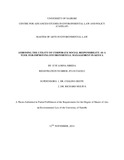| dc.description.abstract | Corporate Social Responsibility (CSR) can be defined as an umbrella term for a variety of
theories and practices all of which recognize that: corporations have a responsibility for their
impact on society and the natural environment, sometimes beyond legal compliance and the
liability to individuals; corporations have a responsibility for the behaviour of others with whom
they do business; and that corporations need to manage their relationship with the wider society,
whether for reasons of commercial viability, or to add value to society. In spite of its current
popularity, however, CSR remains an ambiguous and much debated construct. For instance, the
proper dimensions of a corporation‘s social responsibilities and the relationship between
corporate social performance (CSP) and environmental management are still the subject of lively
controversy.
In Africa however, CSR has not yet been properly institutionalised. In Kenya, for example,
although the concept of CSR is gaining some prominence within policy debates, it is not applied
widely and is usually associated with philanthropy, which lacks set regulatory, legislative and
insitutional framework to act as guidelines upon which the practicing corporations can base and
check their practice. The government has been accused of being reluctant to impose regulations
for fear of discouraging domestic investment, and such fears have mitigated the introduction and
enforcement of more stringent regulations for corporations. In addition, inefficient legal systems
and uncertain regulatory frameworks allow for different interpretations and varying degrees of
compliance. Whereas CSR is widely adopted by corporations across the country, there is limited
linkage in literature between the practice and its utility in environmental management.
Against this backdrop, this study seeks to assess the utility of corporate social responsibility as a
tool for improving environmental management in Kenya. More specifically, the study seeks to
identify factors which are influencing the application of corporate social responsibility in Kenya;
establish the extent of use of corporate social responsibility on environmental management; and
identify the advantages of corporations‘ participation in corporate social responsibility on
environmental management. To accomplish this task, primary and secondary data were collected
from four purposively selected corporations, namely Safaricom Limited, Bamburi Cemen
Limited, Equity Group and the Kenya Railways Corporation. A total of 91 respondents were
reached, out of the 128 targeted, selected on a stratified random sampling technique across the
three management levels that is; top, middle and lower.
Results indicate that the key factors influencing the application of corporate social responsibility
by corporations in Kenya include the concern for the community, the view of CSR as a business
ethics requirement, as an act of corporate philanthropy with a view to benefit communities they
serve, the corporations themselves and their employees as well as in response to crisis such as
accidents, catastrophes. The corporations surveyed reveal a remarkable extent to which CSR is
practiced by corporations in Kenya and the place of environmental management in their
practices. This is seen from the firm level policies instituted, budgetary allocation, though
significantly lower when compared to international best practice, as well as operational activities.
Benefits realized from the practice of environmental CSR by the corporations studied include
increased external stakeholder trust; improved access to Capital; increased ability to attract and
retain employees as well as to improve relations with suppliers.
In view of the study findings, it is the study‘s main recommendation that policy-makers should
make policy linking CSR and environmental management in business practice, focusing their
attention on amending The Companies Act Chapter 486 of the Laws of Kenya to be in line with
the provisions and requirements of the Constitution of Kenya 2010 which provides that national
values and principles of governance bind all state organs, state officers, public officers and all
persons whenever any of them enacts, applies or interprates any law or makes or implements
public policy decisions. This is provided for under Article 10 (1) b) and c) of the Constitution of
Kenya 2010.
The Companies Act Chapter 486 of the Laws of Kenya should also be in line with Articles 10 (2)
c of the Constitution of Kenya 2010 which requires that national values and principles of
governance should be applied and they include good governance, integrity, transparency and
accountability and sustainable development.
The Companies Act should equally be in tandem with Article 42 of the Constitution of Kenya
2010 and Section 3 of The Environmental Management and Coordination Act Chapter 387 of the
Laws of Kenya which provides for the need to protect the environment through legislative and
other measures where the practice of Corporate Social Responsibility (CSR) can be considered
as one of the other measures particularly those contemplated under Article 69 which include
sustainable exploitation, utilization management and conservation of the environment and
natural resources, encourage public participation in conservation of the environment and
establish systems of environmental audit and monitoring, eliminate processes and activities that
are likely to endanger the environment and ensure that every person has a duty to cooperate with
state organs and other persons to protect and conserve the environment and ensure ecologically
sustainable development and use of natural resources.
This will aid in coming up with a comprehensive legal and policy framework and make
appropriate guidelines for the corporations undertaking environmental Corporate Social
Responsibility (CSR) to ensure sustainability as per provisions of the constitution and include
CSR reporting with special emphasis on the environment as the primary concern for various
industrial operations. | en_US |

